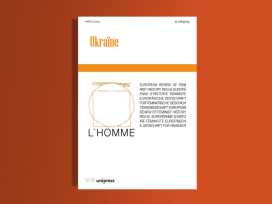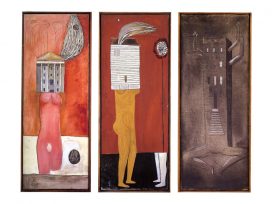Abstracts for L'Homme 2/2006
Anette Baldauf
Shopping Town USA. Victor Gruen, the Cold War, and the Shopping Mall
Victor Gruen has been cited as one of the most influential urban planners of Western cities. In the course of his life, the Jewish émigré from Austria completed major urban interventions in the US and western Europe that fundamentally altered the course of city development. Gruen’s fame mostly refers to the insertion of excessive commercial machines into decentred US suburbscapes, where the so-called shopping towns were supposed to strengthen civic life and structure the amorphous, mono-functional agglomerations of suburban sprawl. As distinct manifestations of the post-war area shopping malls now offer insights into cold war anxieties and consumer utopias – and the distinct ideas about gender and race that underline the American Dream.
Daniela Luigia Caglioti
A World Apart: Endogamy and Refusal of Integration in a Group of Elite Migrants in Nineteenth-Century Southern Italy
This article explores the marriage strategies and behaviour of three generations of Protestant and German-speaking migrants, mainly coming from Switzerland and the German Confederation, who settled in Naples (Italy) during the nineteenth century. Once these migrants, who were entrepreneurs and businessmen, arrived in Southern Italy, they founded cotton firms and operated in banks and trade, importing technologies, machines, modern patterns of management, and frequently also technicians and workers. They also built a religious community, schools, a cemetery, clubs, philanthropic societies, and a church. Resourceful, drawing on considerable social capital, and sharing a high level of training and culture, they developed a specific pattern of settlement, avoiding contacts and formal relationships with the local elite and refusing integration and assimilation in the host society. The article shows how a high level of marriage endogamy (national, religious, and social), growing in second and third generations, helped to protect and perpetuate this Protestant enclave. It also examines the role played by gender, friendship, kinship, origins, education, and religion in orienting marriage strategies.
Nikola Langreiter
Party Selling. On Modern Hawking through the Example of Tupperware
If authors write about Tupperware, they usually deal with design, with plastic as the leading material of the 1950s, or with US lifestyle. Since comprehensive research done by Alison J. Clarke, even the history of the company is – almost – not a secret anymore. Here, attention is primarily drawn to the special way of selling these plastic bowls, tumblers, and storage containers. The survey on literature about Tupperware focuses on party selling; gender aspects are of particular interest.
Anne Montenach
“Hidden Workers”. Women in the Food Trade in Seventeenth-Century Lyon: Resources and Strategies
The purpose of this article is to discuss the economic role of women in the food trade of Lyon during the seventeenth century. Recent research has demonstrated that in early modern European cities, a high percentage of economic activity took place outside the normative structure of the guilds. The role of women in the craft and retail trade therefore has to be reconsidered. It is necessary to look beyond their varied legal and professional status and try to unveil their actual involvement, for example through judicial sources, in the early modern economy, within or outside the guilds. Using both official and repressive accounts, it is possible to reposition their activity within a larger set of household strategies for survival. The hypothesis is that what takes place on the margins of the law should not only be considered as an epiphenomenon but also as an essential component of exchange. The progressive emergence and institutionalization of guilds undoubtedly but paradoxically led to the exclusion of women. However, this emergence must not hide the connections that are actually preserved between the “informal” and “official” economy.
Amira Sonbol
Negotiating and Disputing Marriage and Business in Early Modern Egypt and Palestine
Using a methodology that looks at text as the product of a living community, as evidence of social interaction involving issues, conflicts, and accommodations experienced by people in their everyday lives, it is possible to construct a social history based on the concrete realities of a people’s historical experience. This can be the case in regards to the history of Muslim women. Theological discourses see and seek to define women within submissive roles regardless of their social, intellectual, or financial conditions. However, reading historical records like chronicles and Shari’a court records, and a closer scrutiny of fiqh, shows clear disparities between what discourses of submission establish as the “Islamic” way for women and the actual demeanour of women in their daily lives and negotiations with other members of their families and societies, whether male or female.
Published 6 February 2007
Original in English
Contributed by L'Homme © L'Homme Eurozine
PDF/PRINTNewsletter
Subscribe to know what’s worth thinking about.



